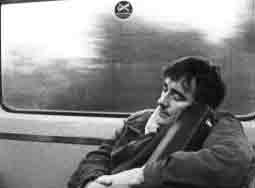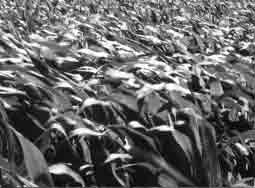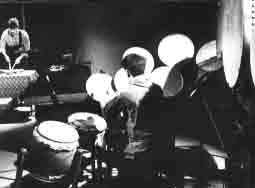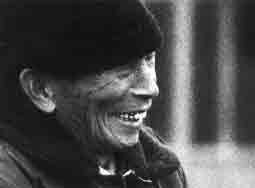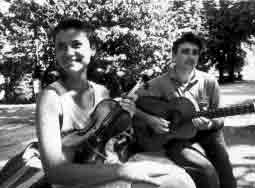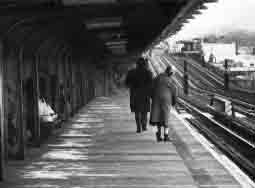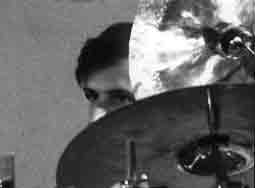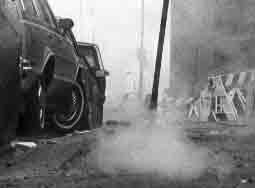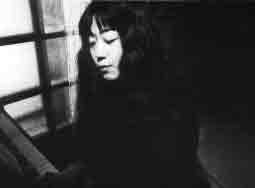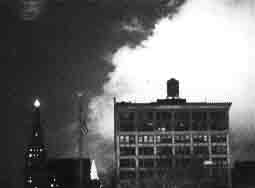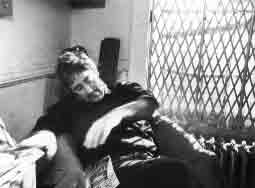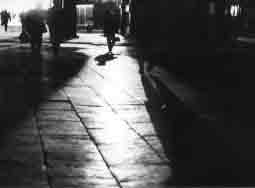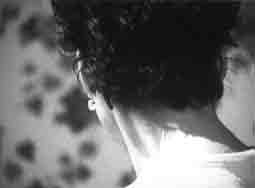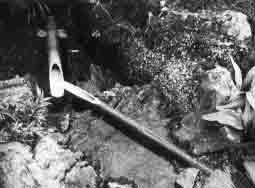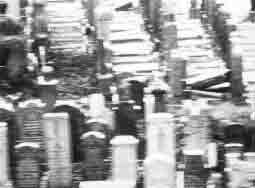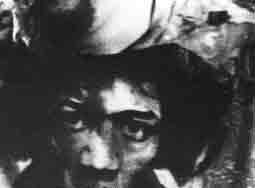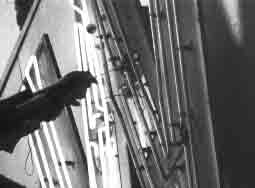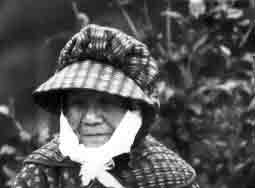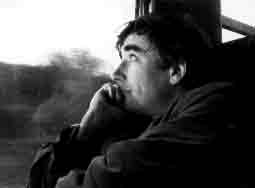Step across the Border
A ninety minute celluloid improvisation
35mm / 1:1.66 / black
& white / mono / 90 min.
produced 1987-90
released 1990
Produced by
CineNomad, Germany
Balzli & Cie, Switzerland
Written and directed
by
Nicolas Humbert & Werner Penzel
Music composed and
performed by
Fred Frith & friends
Short synopsis
In "Step Across the Border" two forms of artistic expression, improvised music and cinema direct, are interrelated. In both forms it is the moment that counts, the intuitive sense for what is happening in a space. Music and film come into existence out of an intense perception of the moment, not from the transformation of a preordained plan. In improvisation the plan is revealed only at the end. One finds it. The other connection concerns the work method: the film team as band. Much as musicians communicate via the music, our work, too, was realized within a very small and flexible team of equals. What mattered was exchange. And movement. Sometimes we started filming in the middle of the night, responding to a new idea that had arisen only minutes before. We had a fundamental feeling for what we wanted to do, for what kind of film this should be. And we followed that feeling. It was all very instinctive...
Do you know a white rabbit who, playing trumpet, circles the world on
his flying carpet?
May be you have met him somewhere already, in Zurich, London, Leipzig,
Tokyo or New York. That at least was about the route we took and what
resulted from it was the black-and-white wink of an eye at the symphonic
connection between subways, storms and electric guitars.
An American critic wrote: 'Fred Frith's music makes your jaw drop, your
feet dance, and your neighbours move.'
Also starring: several telephones, puddles, scarecrows, saxophones, orchestrated
cities and motors.
A music film.
Distributed by
Worldwide: CineNomad
- cinenomad@aol.com
USA, Canada: DAME
e-mail: info@actuellecd.com
website: www.actuellecd.com
VHS-NTSC video and CD soundtrack distribution
USA, Canada: Canyon
Cinema
e-mail: films@canyoncinema.com
website: www.canyoncinema.com
cinema distribution, 35 mm
France: K-Films
e-mail: k-films@wanadoo.fr
website: www.k-films.com
video & cinema distribution, 35 mm
Germany: Cine Nomad
e-mail: cinenomad@aol.com
website: www.cinenomad.de
video & cinema distribution, 16 mm & 35 mm
Germany: 235 Media
e-mail: mail@235media.com
website: www.235media.com
video distribution
Germany: Efa Medien
website: www.efa-medien.de
soundtrack
Switzerland: Look Now!
e-mail: Looknow@kino.ch
cinema distribution, 16 mm & 35 mm
Switzerland: RecRec
Medien
e-mail: vertrieb@recrec.ch
website: www.recrec.ch
video & CD soundtrack distribution
Japan: Contact:
P3 Art and Environment
e-mail: shino@P3.org
website: www.P3.org
Holland: Filmmuseum Amsterdam
e-mail: info@filmmuseum.nl
website: www.filmmuseum.nl
cinema distribution, 35 mm & 16 mm
Musicians
Fred Frith, Joey Baron,
Ciro Battista, Iva Bitová, Tom Cora, Jean Derome, Pavel Fajt, Eitetsu
Hayashi, Tim Hodkinson, Arto Lindsay, René Lussier, Haco, Kevin
Norton, Bob Ostertag, Zeena Parkins, Lawrence Wright, John Zorn
and many others
Special Appearence by
Robert Frank, Julia Judge, Jonas Mekas, Ted Milton, John Spacely, Yasushi Utsonomiya, Tom Walker
Team
Cinematography - Oscar Salgado
Original Sound Recording - Jean Vapeur
Camera Assistance - Dieter Fahrer
Location Manger - Peter Zobel
Production Manager - Res Balzli
Film Editing - Gisela Castronari, Vera Burnus, Nicolas Humbert, Werner
Penzel
Graphics and Animation - Lena Knilli, Cornelia Förch
Mixing - Max Rammler
Studio Recording Engineers - Benedykt Grodon, Rainer Carben
Shot in
Tokyo, Osaka, Kyoto
(Japan)
Verona (Italy)
St. Remy de Provence (France)
Leipzig (Germany)
London, Yorkshire (Great Britain)
New York (USA)
Zurich, Bern (Switzerland)
Awards
European Film Award
1990
Hessischer Filmpreis 1990
Bundesfilmpreis 1991 - Nomination
Grand Prix International "Images&Documents" Figuera da Foz
1990
Uppsala Filmkaja - Best Documentary Film - Uppsala 1990
Innovative Cinema Prize 1991
Golden Gate Award - Special Jury Award - San Francisco 1991
Qualitätsprämie EDI - Switzerland 1990
Prädikat Besonders Wertvoll
Goldene Filmspule 1991 - Kommunales Kino Weingarten
Selected under the 100 most important movies in film-history by the critics of Cahiers du Cinema , Paris 2000
Festivals
Solothurn, Berlin, Strasbourg, Salzburg, München, Sydney, Wien, Warschau, Locarno, Toronto, Figuera da Foz, Uppsala, Montreal, Trient, Viareggio, Florenz, London, New York, Leningrad, Göteborg, Los Angeles, San Francisco, Washington, Marseille, Jerusalem, Tampere, Minneapolis, Dublin, Triest, Kopenhagen
Press
Rock's greatest moment
is, well, jazzy
"Step Across the Border" the most important mix of music and
film since the early '70s
Before MTV unplugged
Nirvana or the stage plugged in Tommy, before MuchMusic, or the rest of
rock video, before there was such a thing as the "rockumentary"
or the sycophantic concert flick - before all that came to pass, the very
idea of rock - of popular music of any kind - coupled with something else,
caused a stir.
Especially film. Rock and film.
It was the mating of two alien life-forms - no, maybe it was more like
cats coupling at midnight; a pretty loud, nasty and memorable business
for the listeners as well as, one presumes, for the cats themselves. Renaldo
& Clara, with and by Bob Dylan, was the last rock flick that mattered,
and that was in the early 70s.
Until Step Across the Border, that is.
And, not to mince words, it's arguably the greatest sustained bit of popular
music on film since Shall We Dance, with Fred Astaire and Ginger Rogers
in 1937 - and that includes Gene Kelly's heartbreak final ballet in An
American in Paris, Jazz On A Summer's Day or Dylan in Don't Look Back.
No question. As Frith connects primal rock with everything from North
African Pop to traditional Japanese percussion music to techno art-band
stuff from New York in the late '80s when the film was shot, we're given
one enormously imaginative extension of the potential of North American
pop music.
This, he shows, is where the roots-connected pop of the 21st century has
to go. Or, with this film, it has already gone...
(Peter Goddard, New York Times)
Afloat in a Stream Of Musical Images
The best definition
anyone's yet given of "free jazz" - it was Charlie Haden's,
natch - is that kind of improvisational music that takes off on the "inspiration
of the composition rather than on the chord changes."
Substitute "narrative line" for "chord changes" and
the definition works for what filmmakers Nicolas Humbert and Werner Penzel
are trying to pull off in "Step Across the Border," the closest
anyone's come since "Pull My Daisy" the Jack Kerouac-scripted
short made way back in 1959 by Robert Frank, to bringing a free-associating,
jazz sensibility to filmmaking.
"Step", like "Daisy", is filmed entirely in glorious
black-and-white - and looks even grainier
than the older movie. It is a series of visual and musical tangents taking
off from each other in seemingly aimless, yet enchantingly elliptical
fashion. One minute we're at a rehearsal of musicians making controlled
dissonance. The next, we're listening to filmmaker Jonas Mekas hold forth
on something called "the butterfly wing theory", which summed
up, goes something like this: Everything that moves in the world affects
everything else, even a butterfly's wing.
(Gene Seymour, New York Newsday)
